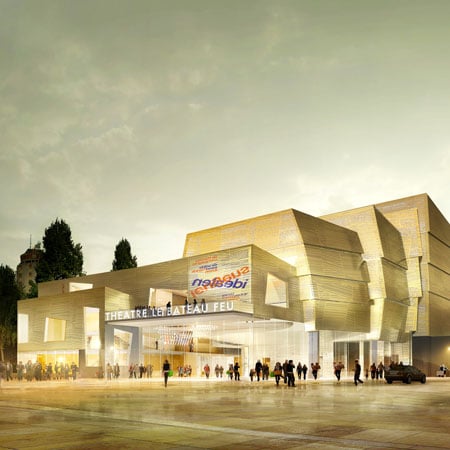
Théatre le Bateau Feu by Mikou Design Studio
Mikou Design Studio of Paris have won a competition to renovate a theatre in Dunkerque, France.
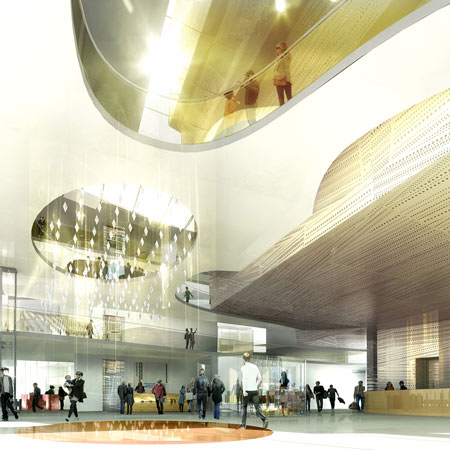
Called Théatre le Bateau Feu, the building will be clad in golden-coloured perforated metal, rising in stepped volumes from the square on which it is situated.
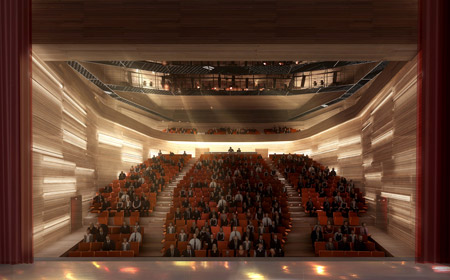
It will contain a concert hall, smaller theatre, practice hall, dressing rooms, storage and offices, as well as the foyer, cafe, bar and gift shop.
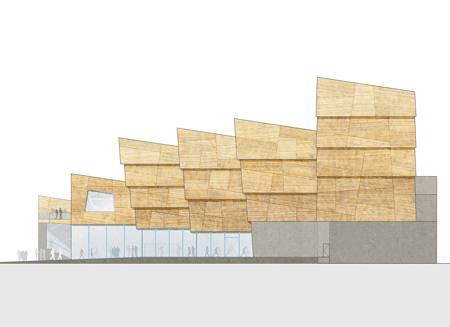
Here's some more information from Mikou Design Studio:
--
“A theatre as an open, structuring urban venue”
We conceived the new Bateau Feu theatre in Dunkirk both as an open urban venue – which is welcoming by the diversity of the complementary programme of events and activities that it provides and their strategic orientation in the urban space – and as a structuring civic building and arts amenity located on the Place du Général de Gaulle square.
By its location on Place du Général de Gaulle, the Bateau Feu theatre orchestrates several scales and dimensions, with four free façades that face onto and react to various different urban situations: an intimate domestic scale on the west for housing and the planted garden, a public scale on Rue du Jeu de Paume, a developing future major thoroughfare onto which the shops of the future shopping centre face, and a non-institutional scale on Place du Général de Gaulle which questions the expression of a new contemporary theatre in the city.
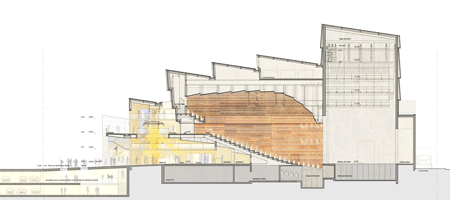
Click for larger image
On the east, the façade of the theatre’s large hall faces onto the urban space in an architectural and spatial composition which links together the inside and outside of the amenity.
On the south, the theatre “enters the city”, welcoming the public in the flow of spaces designed on the urban site. The open, generous entrance foyer – which is itself in dialogue and spatially connected with the large hall on the ground floor – and the small hall, the café bar, the bookshop and the lounge areas on a south-east diagonal which links together these social meeting-places.
The glazed monumental staircase leading to the raised foyer and to the upper entrance to the large hall, placed on the south façade on the side of the entrance esplanade, also participates in this spatial scenography of the theatre’s significant spaces. Visually, it opens the space on the underside of the forum pierced by large voids, allowing through top lighting and revealing the volume of the large hall. A chandelier designed like a lighted canopy increases the theatrical effect and corresponds to the vibrations of the internal space.
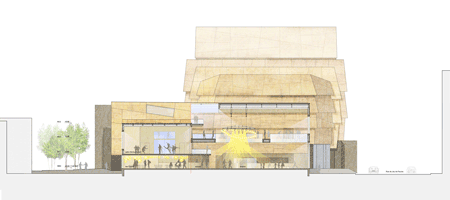
Click for larger image
Expression and materiality
The renovated theatre is a unified building that is arranged in steps that descend to the square in a succession of light, vibrant volumes from the stage-house to the foyer.
The architectural expression chosen for the theatre’s façades is a perforated metal cladding in a range of luminous ochre tones which matches the mystery and magic of the theatre.
The successive setbacks of stepped volumes reveal a series of large illuminated “frames” that face towards the square. An artificial lighting system shall be placed in these frames, between the rain barrier and the perforated metal cladding, to create night lighting and to visually enhance the theatre and the square.
On the west, in the garden, the building melts into the intimacy of the housing with an anthracite brick plinth that matches the scale of the block of housing and creates a visual distance from the perforated metal elements located in the background.
This new theatre is open to everyone. Its extension and rehabilitation provides an opportunity for experimenting the effects of architectural and urban renovation on the public.
It offers a variety of spaces and provides a multitude of possibilities for using, occupying and experiencing the various spaces related to the theatre and its annexes, to cater for different types of people and allow different circulation flows of people at the same time.
Mikou Design Studio is a place of creation and experimentation in architecture and its inter-disciplinary cross-fertilisation. We work in a continuous workshop spirit with a multidisciplinary team of architects, engineers, graphic artists, scenographers and town planners from very different cultural backgrounds.
Every project is an excuse for re-questioning and redefining the meaning of a brief, a function, and an urban, social and human context, in order to invent new ways of living, places for sharing and gathering that are more sensitive and more sensual, and which stimulate feelings.
Our aim is to get away from preconceptions of form and function in order to transmit more and better.
Mikou Design Studio is currently involved in a large number of projects throughout France, Germany and Morocco, with a focus on cultural, educational, housing and offices.
The two partners, Salwa and Selma Mikou were born in Fes Marocco. After attending school in Paris (Paris Belleville) and Lausanne (EPFL), they received their diploma on Architecture and Urban design in 2000.
During 2000 to 2005 they worked at RPBW (Renzo Piano Building workshop) and AJN (Ateliers Jean Nouvel) Paris where they were in charge of international projects in Abudhabi (Lulu Island), Doha (Urban design of Doha waterfront), Los Angeles (Lacma museum), Seoul (Samsung Chairman house), Beirut (Condominium offices and hotel), Rabat (Bouregreg Valley), Kuwait (Performing Art Center and hotels), London ( legal and general offices).
They co-founded Mikou Design Studio in 2005.
Dunkerque Theater
Competition November 2009
Mikou Design Studio architect
Winning entry
Area 4500 sqm
Program Concert Hall, Black box Theater, Foyer, Practice hall, Dressing room, Backstage,
Storage, café, bar, gift shop, offices
Budget 15 Millions Euros